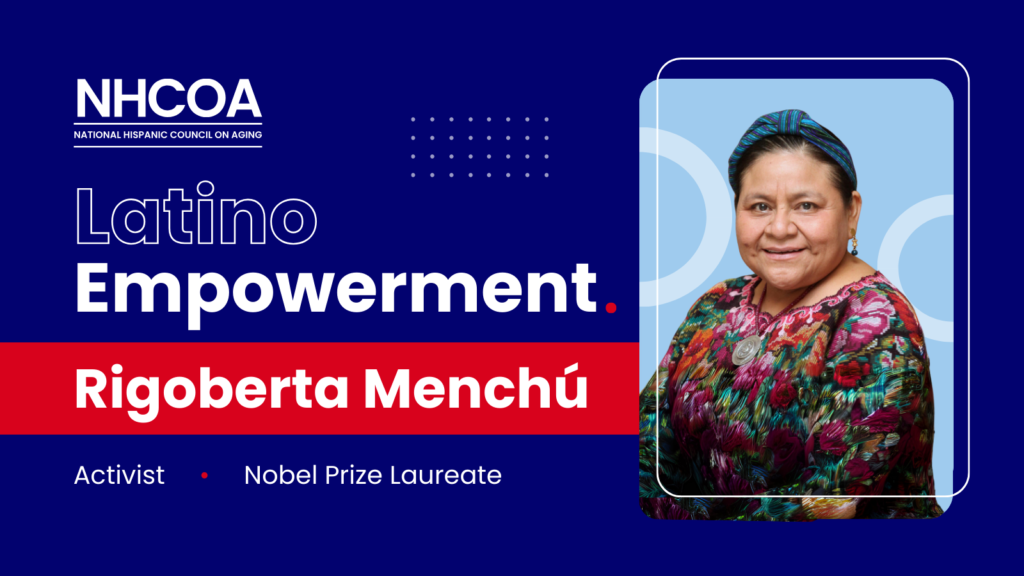
“I consider this Prize, not as an award to me personally, but as one of the greatest achievements of the struggle for peace, for human rights and for the rights of indigenous peoples, who throughout these 500 years have been divided and fragmented and have suffered genocide, repression and discrimination.”
Rigoberta Menchú Tum, Acceptance Speech and Lecture at the Nobel Peace Prize Ceremony, 1992
Rigoberta Menchú Tum is an activist and advocate for peace, social justice, and human rights of indigenous peoples in Guatemala who from a very young age became involved in the struggles of indigenous peoples and farmers in her native country, which earned her political persecution and exile. She was born into a Mayan rural family. During her childhood and youth, she suffered poverty, racial discrimination, and the violence that the Guatemalan indigenous population has suffered for decades.
Born on January 9, 1959, in Chimel, municipality of San Miguel Uspantán, Department of El Quiché, Guatemala. Of Mayá-quiché origin, her parents were Juana Tum, a traditional healer, and Vicente Menchú, a community leader.
Due to the extermination policy against the Mayan indigenous population that the Guatemalan government implemented in the country, Rigoberta was a victim and suffered the loss of a large part of her family: her mother and older brother were tortured and murdered by the soldiers, and her father was burned alive during a protest. This is why, from a young age, Rigoberta became involved in various social causes and participated in international forums to denounce the economic, social, cultural, and political inequalities in her country.
She was a founding member of the Committee for Campesino Unity (CUC) and of the United Representation of the Guatemalan Opposition (RUOG), of which she was a member until 1992. During this period the national army carried out a campaign against the population suspected of belonging to any armed group, for this reason, she was forced to go into exile in Mexico, where she arrived in 1981 supported by Catholic militant groups. From this country, she dedicated herself to denouncing at the international level the grave situation of the indigenous Guatemalans and contributed to the elaboration of the Declaration of the Rights of Indigenous Peoples at the UN in 2007.
She won the Nobel Peace Prize in 1992, becoming the first and youngest indigenous woman to receive it. With the money received from the prize, she established the Vicente Menchú Foundation, whose mission is to contribute to the recovery and enrichment of human values for the construction of an ethic of world peace, based on the ethnic, political, and cultural diversity of the peoples of the world.
El 10On August 10, 1993, the General Council of the University of Guadalajara awarded her an Honorary Doctorate in “recognition of her contributions in the field of the defense of human rights and the vindication of indigenous people, in favor of dignity, justice and peace”. In addition, she received honorary doctorates from the Central American University (UCA) of Nicaragua, on October 8, 1992; from the National University of El Salvador, on February 2, 1993; from the National University of Costa Rica, on February 5, 1993; from the University of Oklahoma, United States, on May 8, 1993; and from the University of Cochabamba, Bolivia, on August 19, 1993.
UNESCO awarded her the Education for Peace Prize, and on October 23, 1998, in Oviedo, together with five other women, she received the Prince Felipe de Borbón Prince of Asturias Award for International Cooperation from Prince Felipe de Borbón.
In 2007, she was a candidate for the presidency of the Republic of Guatemala, nominated by her movement Winaq and the center-left Encuentro por Guatemala party. Currently, Rigoberta Menchú is a UNESCO Goodwill Ambassador and continues to fight to promote dialogue and social justice in Guatemala and continues to search for alternatives to strengthen the active participation of indigenous peoples in decision-making about their needs and rights. She is active in the Nobel Peace Prize Women’s Initiative (of which she is a co-founder) and the Peace Jam Foundation and is a founding member of the Mayan Women’s Political Association.
References:

Recent Comments